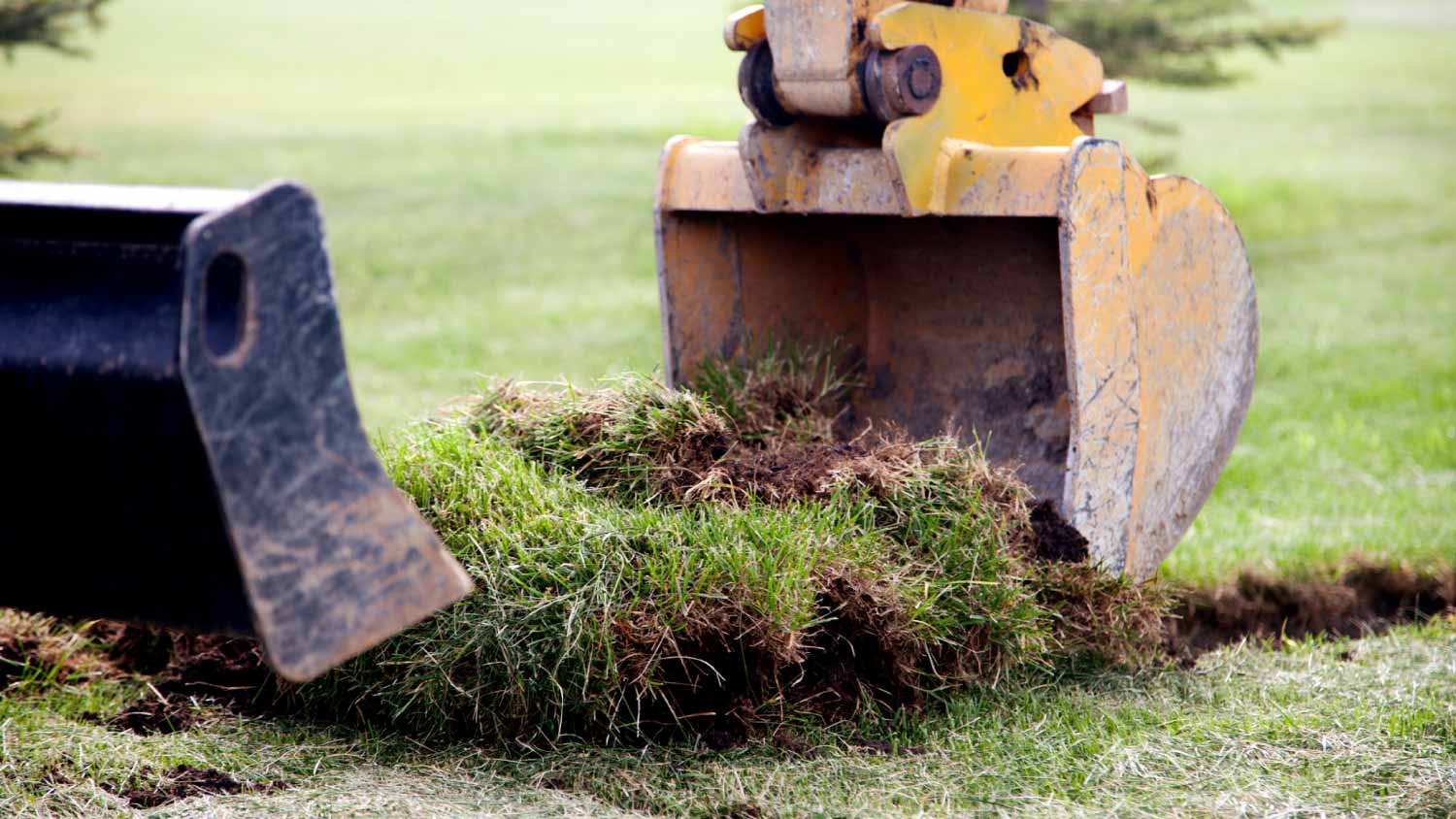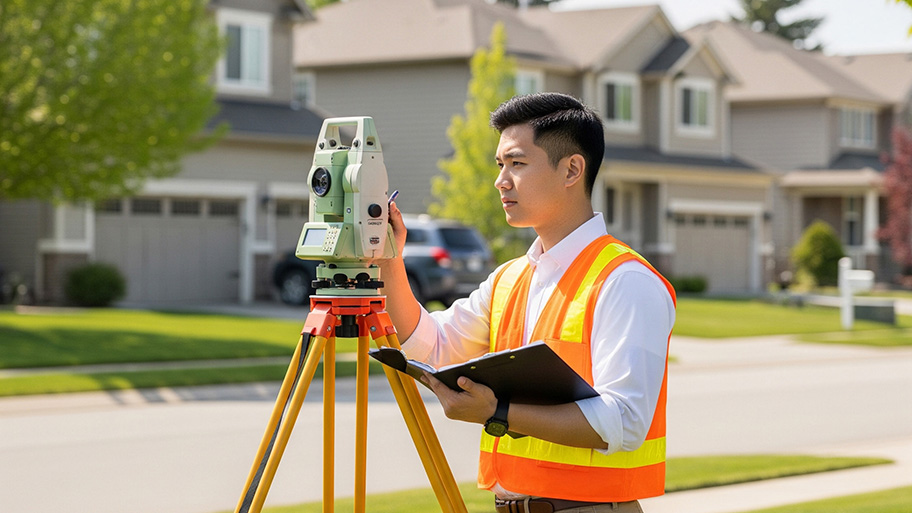
Just bought a plot of land and need to get it build-ready? Learn how much it costs to clear land to gauge your initial budget before you break ground.
Survey says: Land surveys are more intensive and provide more information


A boundary survey is a type of land survey that shows you exactly where your property ends and the neighboring properties begin.
Land surveys can include boundary lines, but they can also show structures, topography, buried utility lines, and more.
Boundary surveys cost between $100 and $600, while land surveys can cost up to $3,000.
Whether you’re selling your home, buying a new property, or doing a major renovation or add-on to your existing home, your professionals may let you know that you need a survey. But what kind? What’s the difference between a land survey and a boundary survey? In this guide, we’ll explain what both types of surveys tell you and help you decide which is best for your situation.
The term “land survey” is a blanket term that can include many different types of surveys, including boundary surveys. Land surveys can tell you about topography, the location and dimensions of structures on your property, whether your land has any easements, and more. Boundary surveys just give you details about the perimeter of your property.
When taking on this project, expect questions only a pro can answer. With our network of local pros, you'll get the job done and your questions answered—without the hassle and stress of doing it yourself.

A land survey can be one or several of many different kinds of surveys, including the following:
Boundary survey: Gives you details about the perimeter of your plot
ALTA/ACSM survey: Includes most of the other types of land surveys for a comprehensive breakdown of the property
Mortgage survey: Similar to ALTA/ACSM surveys, but the requirements can vary by lender
Topographic survey: Gives you 3D information about your land, including slopes, structures, and more
As-built survey: Provides detailed information about the dimensions and layout of your home as it was constructed
Construction staking: Pre-construction survey to locate utility connections, determine the location of easements, and more
Elevation survey: Provides details about your plot’s elevation and relation to the water table and surrounding land, often to determine flood risk
| Pros | Cons |
|---|---|
| Tons of information | Expensive |
| Legal necessity | Requires a pro |
Best for:
People who are purchasing homes and want or need detailed information for their lenders or their own records
Getting approval for major construction projects, new construction, and renovations
Getting mortgage approvals
Determining if you need flood insurance for your home
Land surveys provide many benefits, including detailed information about every aspect of your property. You’ll often need a land survey to buy or sell a home, to carry out new construction, or to complete major renovation projects, so they’re very often a legal necessity.
Land surveys also help ensure that your project is legal and done safely. They can identify easements and underground utility locations so you can avoid illegal or dangerous digging or construction, and they can also identify if you need flood insurance to keep your home protected.
One major downside of a land survey is that it can be expensive. A land survey costs up to $3,000 in some cases if you need a survey approved by the American Land Title Association (ALTA) or the American Congress on Surveying and Mapping (ACSM). Boundary surveys provide less information, but they’re less than 30% of the cost of a land survey in almost all cases.
Another downside of a land survey is that you can’t DIY the work. Unfortunately, this is the case with boundary surveys, as well. In order for your results to be official and legal, you have to hire a land surveyor near you.

A boundary survey is a type of land survey, and it’s one of the simpler and more affordable options. It just gives you information on precisely where your property lines begin and end on all sides.
| Pros | Cons |
|---|---|
| More affordable | Limited information |
| Legal necessity | Requires a pro |
Best for:
Settling boundary line disputes with neighbors
Ensuring your construction project doesn’t violate setback regulations
Determining where you can install a fence on your land
Boundary surveys give you detailed information about your property lines, so they’re great for settling boundary line disputes with neighbors, determining where you can put up a fence, confirming the size of your property if you’re buying or selling, obtaining a zoning permit, and ensuring any construction adheres to set back regulations.
Boundary surveys may provide limited information, but they’re far more affordable than land surveys, totaling between $100 and $600 in most cases. It’s the better option if you just need information about your boundary lines.
Of course, the lack of information you’ll get from a boundary survey can also be a drawback. If you pay for a boundary survey and then find out you also need information about easements, dimensions of your structures, or the location of utility lines or easements, you’ll have to pay again for a land survey and end up spending more in total.
Much like a land survey, you’ll need a professional to complete your boundary survey for you in order for the results to be official and legal.
There are a few key differences between land surveys and boundary surveys that can help you decide which one you need.
Land surveys can provide all of the information a boundary survey does and much, much more. If you just need to determine where your property lines are, a boundary survey will likely suffice. If you need information about easements, underground utility line locations, topography, flood zone information, or topographical information, a land survey is the better option.
Boundary surveys may provide far less information, but that also means they cost much less. A boundary survey costs between $100 and $600 in most cases. Complete land surveys will often total between $2,000 and $3,000, although some options that provide less extensive information can cost under $1,000. Note that the buyer pays for a land survey in a real estate transaction, so the cost may not matter if you’re selling land.
Boundary surveys can help settle property line disputes and determine where you can build fences and other structures on your property, but that’s where their utility ends. Land surveys can show easements on your property, utility locations, land slope, drainage, and much more.
Boundary line surveys just show you your property lines, but with a land survey, you can order a few different kinds of surveys depending on what information you need. That includes boundary surveys, mortgage surveys, ALTA/ACSM surveys for buying or selling land, and more.
Unfortunately, you can’t DIY either type of survey. You’ll need to hire a land surveyor in order for the results to be official and actionable.
Boundary surveys and land surveys are good for five to ten years. The actual timeline depends on your location and how long your professional is willing to guarantee the results, but the timeline should be the same for both types of surveys.
From average costs to expert advice, get all the answers you need to get your job done.

Just bought a plot of land and need to get it build-ready? Learn how much it costs to clear land to gauge your initial budget before you break ground.

Discover site preparation cost estimates, including average prices, cost factors, and tips to help homeowners budget for their next project.

A land survey can determine your property’s borders and settle property disputes. Learn how much a land survey costs and what can affect the price.

A land surveyor can perform a land survey and help clarify your property boundaries and features. Use this guide to find the right professional.

Find out how much an elevation certificate costs, including average prices, cost factors, and tips to save money when hiring a surveyor for your property.

Wondering whether you need a land survey or a plot plan? Learn about the differences between the two, when to do each, and what information they provide.